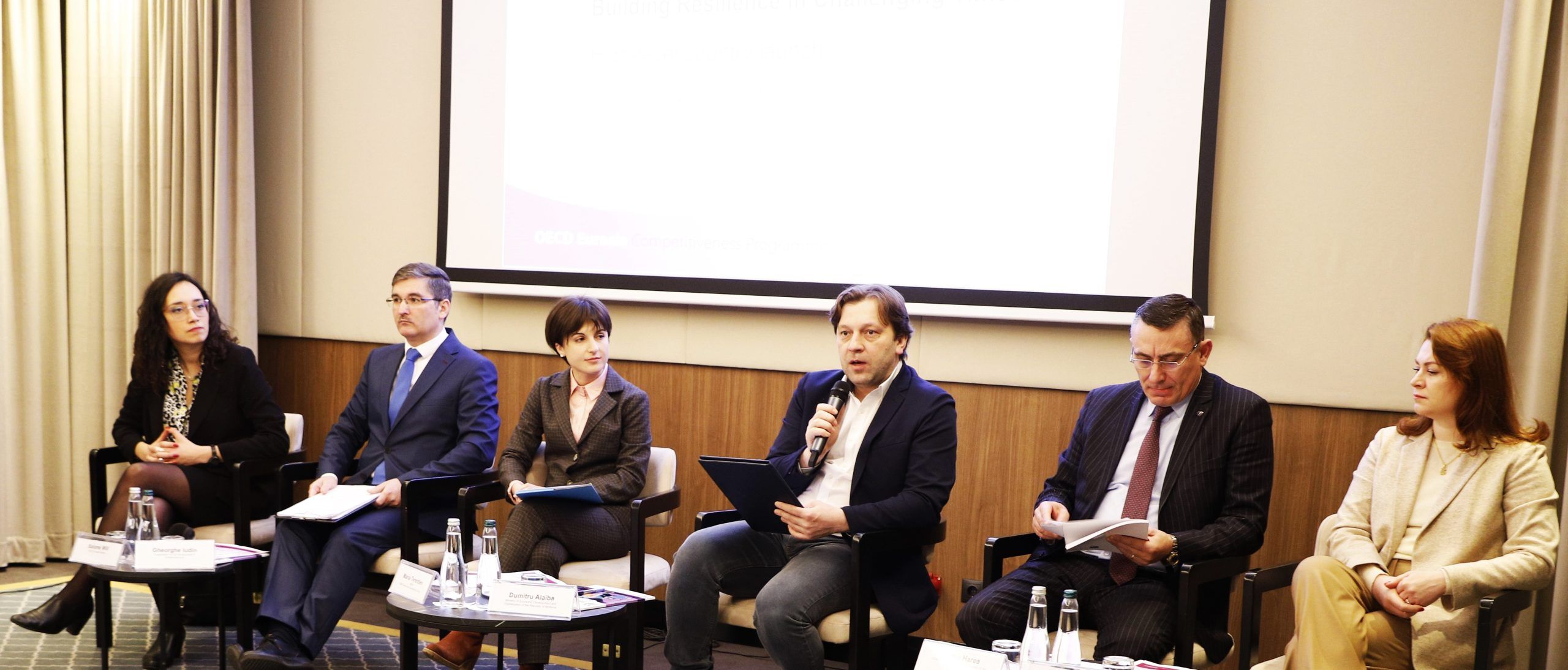
Politici de susținere a IMM-urilor din Republica Moldova. Rezultate și progrese, prezentate într-un raport al Organizației pentru Cooperare și Dezvoltare Economică (OCDE)
Rezultatele și progresele politicilor guvernamentale pentru susținerea întreprinderilor mici și mijlocii (IMM-uri) au fost prezentate la Chișinău, în cadrul evenimentului „Prezentarea Indicelui de politică pentru IMM-uri 2024 al OCDE: Țările Parteneriatului Estic 2024 – Consolidarea rezilienței în timpuri dificile”. Evenimentul a fost găzduit de către Ministerul Dezvoltării Economice și Digitalizării.
Indicele politicilor ÎMM – urilor este un instrument de evaluare comparativă pentru analiza și urmărirea progresului în inițierea și implementarea politicilor ÎMM-urilor în concordanță cu bunele practici internaționale, inclusiv cele ale Uniunii Europene. Instrumentul este structurat în jurul celor zece principii ale Actului Întreprinderilor mici și mijlocii pentru Europa (Small Business Act for Europe – SBA) și conține prioritățile stabilite în Strategia UE pentru IMM-uri, pentru o Europă durabilă și digitală. Ghidează implementarea politicilor IMM-urilor, pe principiile de promovare a spiritului antreprenorial, îmbunătățirea accesului la finanțare, reducerea birocrației, îmbunătățirea accesului pe piețele interne și externe.
Small Business Act pentru Europa reprezintă un cadru politic elaborat de Comisia Europeană pentru a sprijini dezvoltarea întreprinderilor mici și mijlocii (IMM-uri) în statele membre ale Uniunii Europene.
Cele mai recente constatări ale RM privind Indicele politicilor pentru ÎMM-uri sunt prezentate aici.
Prezent la eveniment, vicepremierul și ministrul Dezvoltării Economice și Digitalizării, Dumitru Alaiba a menționat că acest raport de evaluare reprezintă un instrument eficient pentru îmbunătățirea și monitorizarea politicilor de dezvoltare a IMM-urilor, cu rol de preluare a expertizei europene și internaționale, precizând că: „Tindem să fim o țară competitivă și, pentru asta, ne concentrăm pe antreprenoriat, pe susținerea femeilor în afaceri și pe ecologizare. Desigur că, în toate aceste domenii, avem încă multe de făcut. De aceea, credem că cel mai important lucru este să investim în oameni. Legile pe care le facem sunt gândite pentru a ajuta și a susține antreprenorii. Mai avem mult de muncă, dar suntem bucuroși că am făcut deja progrese”.
Despre rezultatele raportului a vorbit în format online și Severin Strohal, directoratul general pentru Politici de Vecinătate din cadrul Comisiei Europene care a precizat că: „Republica Moldova și IMM-urile de aici au demonstrat reziliență, în ciuda tuturor provocărilor din ultima perioadă, iar Indicele politicilor ÎMM – urilor este un instrument crucial și un ghid de referinta pentru autoritățile din Moldova, în contextul în care dimensiunea economică este foarte importantă pentru integrarea europeană. Pentru a face față competitivității de pe piața europeană este esențial să ajutăm IMM-urile, să întreprindă schimbările necesare, pentru a trece de la politici la acțiuni, dar și adaptarea cadrului legal, iar succesele se văd în raportul OECD”.
Raportul OECD, privind rezultatele și progresele politicilor guvernamentale pentru susținerea întreprinderilor mici și mijlocii (IMM-uri) a fost prezentat de către analistul politic, OECD Eurasia, Salomé Will, care a menționat că: „Moldova a făcut pași semnificativi de progres, cu rezultate în 11 din cele 12 dimensiuni ale evaluării. Astfel, potrivit raportului, IMM-urile operează acum într-un mediu mai favorabil, cu progrese considerabile în serviciile de e-guvernare și beneficiază de o gamă extinsă de servicii de asistență și digitalizare. Potrivit raportului, Moldova figurează ca fiind cel mai performant în regiune, la capitolul politicile de economie verde pentru IMM-uri. În continuare vom urmări reformele, asigurând implementarea noilor documente strategice generale, cum ar fi PACC și Strategia de transformare digitală, stimulând în continuare competitivitatea și reziliența IMM-urilor prin facilitarea accesului la resurse cheie de sprijin pe parcursul întregului ciclu de viață”.
Evenimentul de prezentare a Indexului OCDE pentru Politici pentru IMM-uri 2024 a fost urmat de primul atelier de lucru OECD-GIZ Moldova, privind susținerea digitalizării IMM-urilor din țara noastră. În cadrul acestei reuniuni la nivel de țară au fost discutate provocările cheie, prioritățile de reformă și instrumentele de politici relevante pentru digitalizarea IMM-urilor din Moldova, pe baza recomandărilor din Indicele OCDE de politici pentru IMM-uri 2024.
Proiectul de recomandări se axează în special pe consolidarea capacităților pentru părțile interesate din sectorul public și pe sprijinirea elaborării unei foi de parcurs orientate spre acțiune pentru digitalizarea IMM-urilor din Moldova.
Republica Moldova se angajează să respecte principiile și mecanismele de sprijinire a IMM-urilor stabilite în Small Business Act pentru Europa. De la ultima evaluare a Small Business Act, s-au înregistrat progrese constante pentru a sprijini dezvoltarea IMM-urilor și transformarea digitală. S-au făcut pași importanți în ceea ce privește alinierea reglementărilor tehnice și a infrastructurii de calitate la standardele internaționale; abordarea cuprinzătoare a învățării antreprenoriale; promovarea specializării inteligente și a cercetării și dezvoltării; și acordarea de prioritate ecologizării IMM-urilor.
Indicele politicilor ÎMM – urilor 2024 a fost elaborat de OECD și BERD, în cadrul unui proiect multinațional „EU4Business: De la politici la acțiune – Faza 2” în Parteneriatul Estic, cu sprijinul financiar al Uniunii Europene în cadrul inițiativei EU4Business și are drept scop – evaluarea mediului de afaceri, cu recomandările de rigoare.








